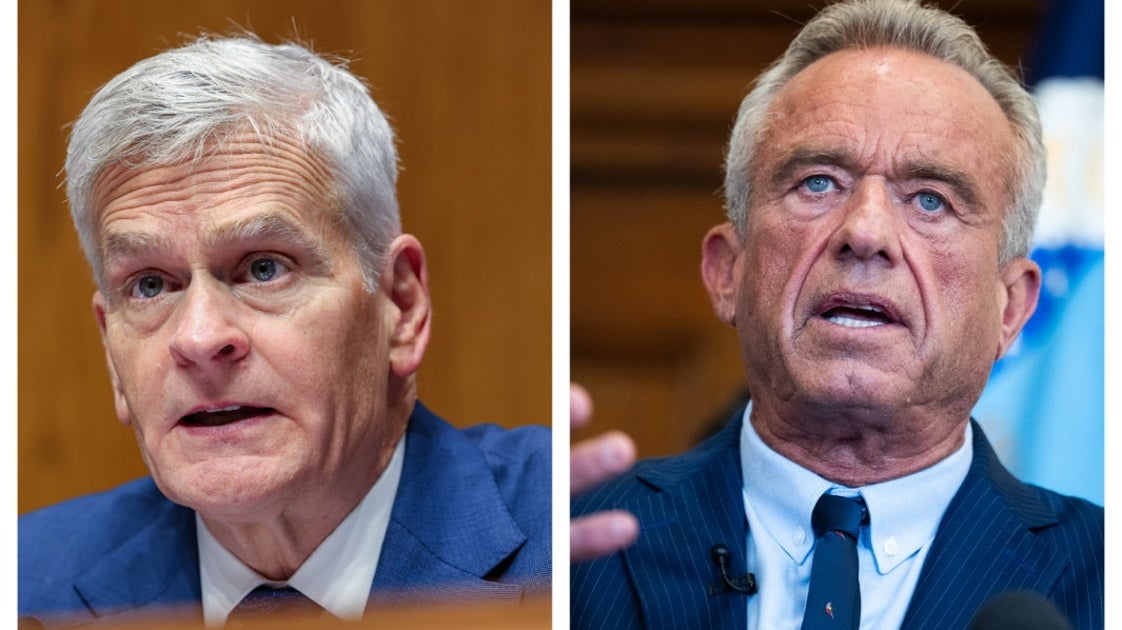Sen. Bill Cassidy (R-La.) criticized Health and Human Services Secretary Robert F. Kennedy Jr.’s decision to cancel a $500 million investment in lifesaving mRNA vaccine research aimed at protecting the U.S. against future viral threats.
“It is unfortunate that the Secretary just canceled a half a billion worth of work, wasting the money which is already invested,” Cassidy wrote in an online post on Wednesday following the HHS announcement. “He has also conceded to China an important technology needed to combat cancer and infectious disease.”
“President Trump wants to Make America Healthy Again and Make America Great Again. This works against both of President Trump’s goals,” the senator added.
Kennedy wouldn’t be in Donald Trump’s administration without Cassidy’s support for his confirmation earlier this year. The physician, who has served in the Senate since 2015, swallowed his concerns about RFK Jr.’s long record of anti-vaccine views under pressure from Trump’s MAGA supporters who have an eye on his reelection next year. Cassidy has worked hard to get back into Trump’s good graces despite facing a GOP primary.
The Louisiana Republican, who serves as the chair of the Senate health committee, said in February that Kennedy assured him he would not dismantle the nation’s vaccine safety systems; the HHS secretary has moved to do exactly that.
“If Mr. Kennedy is confirmed, I will use my authority as Chairman of the Senate Committee with oversight of HHS to rebuff any attempts to remove the public’s access to life-saving vaccines without ironclad, causational scientific evidence that can be defended before the mainstream scientific community and before Congress,” Cassidy said in a Senate floor speech. “I will carefully watch for any effort to wrongfully sow public fear about vaccines between confusing references of coincidence and anecdote.”
He added: “But my support is built on assurances that this will not have to be a concern and that he and I can work together to build an agenda to make America healthy again.”
Messenger RNA, or mRNA, technology has been used to successfully save countless lives, including by developing vaccines to protect against coronavirus. Medical experts were horrified this week at the Trump administration’s decision to shut the door on a critical tool used to fight future pandemics.
Jerome Adams, who served as the nation’s 20th surgeon general during Trump’s first term, warned on social media that the decision will have very real negative consequences.
20 Years OfFreeJournalism
Your Support Fuels Our Mission
Your Support Fuels Our Mission
For two decades, HuffPost has been fearless, unflinching, and relentless in pursuit of the truth. Support our mission to keep us around for the next 20 — we can’t do this without you.
We remain committed to providing you with the unflinching, fact-based journalism everyone deserves.
Thank you again for your support along the way. We’re truly grateful for readers like you! Your initial support helped get us here and bolstered our newsroom, which kept us strong during uncertain times. Now as we continue, we need your help more than ever. .
We remain committed to providing you with the unflinching, fact-based journalism everyone deserves.
Thank you again for your support along the way. We’re truly grateful for readers like you! Your initial support helped get us here and bolstered our newsroom, which kept us strong during uncertain times. Now as we continue, we need your help more than ever. .
Already contributed? Log in to hide these messages.
“I’ve tried to be objective & non-alarmist in response to current HHS actions — but quite frankly this move is going to cost lives,” he wrote. “mRNA technology has uses that go far beyond vaccines … and the vaccine they helped develop in record time is credited with saving millions.”
Dr. Michael Osterholm, the director at the University of Minnesota Center for Infectious Disease Research and Policy, told PBS it was the worst decision for public health in 50 years.
“I have served seven different presidential administrations advising them, and I have been through several pandemics. And I can say unequivocally that this was the most dangerous public health decision I have ever seen made by a government body,” he said.

